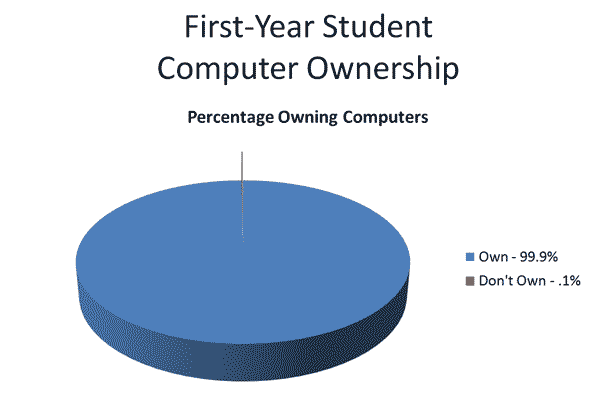What's the point of running a university computer lab when all the students bring laptops anyway? That's a question that schools have been asking themselves as computer ownership rates among incoming freshmen routinely top 90 percent. Schools like the University of Virginia have concluded that the time has come to dismantle the community computer labs and put that money to more productive uses.
According to the school's Information Technology & Communication department, 3,117 freshmen enrolled in 2007, and 3,113 of them owned their own computer. Nearly all of the machines were laptops, with 72 percent running Windows and 26 percent running Mac OS X (six hardy souls ran Linux).
Compared to a decade ago, the increase in student computing hardware is little short of amazing. In 1997, 74 percent of incoming freshmen owned computers, but only 16 percent of these machines were laptops. The Windows chokehold on operating systems looked complete, appearing on 93.4 percent of all machines and leaving only 6.6 percent for the Mac. 
Given these numbers, the school began to suspect that its labs might not be necessary, even though usage remained high. When it surveyed the programs actually launched on lab computers in 2008, it found that 95 of the time students spent in the lab was spent running "free" software like Firefox, Internet Explorer, Adobe Acrobat Reader, or Microsoft Office (the school has a campus license for Office and students can install free $10 copies on their machines). Expensive but niche programs like SPSS—the bane of social science students everywhere—were used only 5 percent of the time.
With labs closing down, the university hopes to save some cash. School vice president James Hilton told The Chronicle of Higher Education that it cost about $300,000 to run the campus computer labs each year, but the amount that the school actually saves will depend on how much it costs to provide alternative access to things like community printers and niche software.
To make specialized software available to students, the school says it will "convene a community to jointly review potential software delivery solutions." Its ideas so far all appear to revolve around accessing specialized tools over the network, possibly through "software streaming" or some form of remote connection to dedicated machines.
The change also doesn't mean that the university gets to reclaim all that physical space from the labs. As the university's explanatory document notes, "ITC understands that students need collaborative space where they can bring their laptops and mobile devices to conduct group work, especially as the curriculum becomes increasingly team- and project-based."
As for supporting this hugely diverse range of hardware that students will schlep to campus, the mind boggles at the tech support nightmares that will soon plague the dreams of IT workers.
reader comments
106